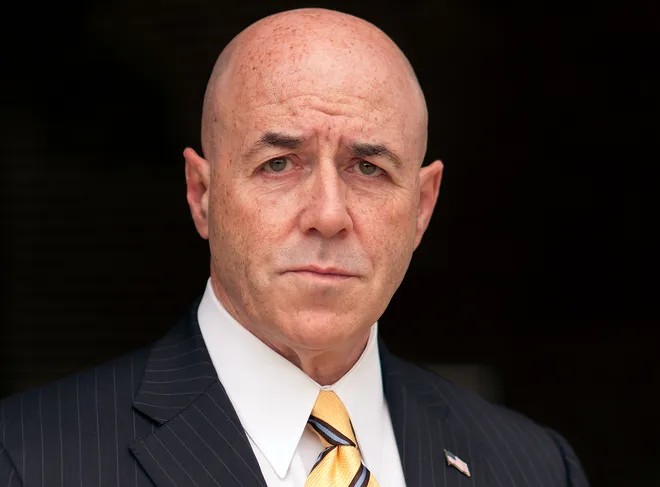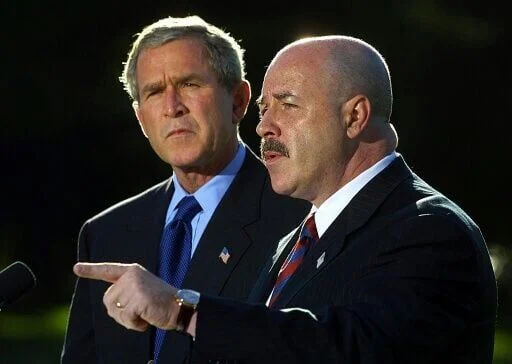Bernard Kerik, a towering figure in American law enforcement, passed away on May 29, 2025, at the age of 69 after a private battle with a cardiac-related illness. Known for his leadership as New York City’s Police Commissioner during the September 11, 2001, terrorist attacks, Kerik’s life was a complex blend of heroism, public service, and personal challenges. His journey from a high school dropout to a decorated public servant, followed by legal troubles and a presidential pardon, paints a vivid picture of resilience and redemption. This article delves into Kerik’s remarkable career, his contributions to New York City, and the controversies that shaped his legacy.

Early Life and Rise to Prominence
Born on September 4, 1955, in Newark, New Jersey, Bernard B. Kerik grew up in a working-class family. After dropping out of high school, he earned a GED and enlisted in the U.S. Army, serving from 1974 to 1977. His early career included roles as a military policeman and later as a private security contractor in Saudi Arabia, where he trained local forces. These experiences laid the foundation for his law enforcement career, which began when he joined the New York Police Department (NYPD) in 1986.
Kerik’s tenacity and leadership skills propelled him through the ranks. By 1998, he was appointed Commissioner of the New York City Department of Corrections, where he managed Rikers Island, one of the nation’s most challenging correctional facilities. His reforms, including reducing inmate violence and improving staff training, earned him widespread praise. In 2000, then-Mayor Rudy Giuliani appointed Kerik as the 40th NYPD Commissioner, placing him at the helm of the nation’s largest police force.
Leadership During 9/11
Kerik’s defining moment came on September 11, 2001, when terrorists attacked the World Trade Center. As NYPD Commissioner, he coordinated the city’s emergency response alongside Mayor Giuliani, becoming a symbol of strength during one of America’s darkest days. His leadership ensured first responders were deployed swiftly, saving countless lives amid the chaos. Kerik’s efforts earned him national recognition, including a presidential commendation for heroism from President Ronald Reagan and two Distinguished Service Awards from the U.S. Department of Homeland Security.
“Bernie was a warrior, a patriot, and one of the most courageous public servants this country has ever known,” said FBI Director Kash Patel in a tribute posted on X. “His legacy is not just in the medals or the titles, but in the lives he saved, the city he helped rebuild, and the country he served with honor.” Hindustan Times
A Fall from Grace
Kerik’s career took a dramatic turn in 2004 when President George W. Bush nominated him to lead the U.S. Department of Homeland Security. However, the nomination unraveled amid allegations of financial improprieties. In 2009, Kerik pleaded guilty to eight federal felony charges, including tax fraud and making false statements, related to unreported income and renovations to his home. He was sentenced to four years in prison, a stark fall for a man once hailed as a national hero.

The legal troubles didn’t erase his earlier contributions but cast a shadow over his legacy. A city jail named in his honor was later renamed, reflecting the public’s mixed feelings. Despite this, Kerik remained a vocal critic of the criminal justice system, advocating for reforms based on his experiences. In 2020, President Donald Trump pardoned Kerik, citing his service and contributions to national security. The pardon reignited debates about his legacy, with supporters viewing it as justice restored and critics questioning the decision. NBC News
Post-Pardon Life and Political Involvement
After his pardon, Kerik reemerged as a staunch Trump ally, working closely with Rudy Giuliani to investigate unfounded claims of election fraud following the 2020 presidential election. His involvement drew scrutiny, particularly when he was subpoenaed to testify in a Georgia election interference case involving Trump and his associates. Kerik’s attorney, Timothy Parlatore, stated that Kerik would invoke his Fifth Amendment rights unless granted immunity, highlighting the legal complexities surrounding his later years.
Kerik also testified before the House committee investigating the January 6, 2021, Capitol riots, further cementing his role in politically charged events. Despite these controversies, he remained a respected figure in some circles, particularly for his outreach to New York’s Jewish community during his NYPD tenure and his advocacy for law enforcement reforms. Fox News
Personal Life and Legacy
Kerik was married to Hala Matli, a Syrian immigrant he met in 1996, and the couple had two daughters, Celine and Angelina. He also had a son from a previous marriage to Jacqueline Llerena. Tributes from figures like Giuliani, who called Kerik “like my brother,” underscored the deep personal bonds he formed. Giuliani, speaking on “The Rudy Giuliani Show,” said, “I was a better man for having known Bernie. I certainly was a braver and stronger man.”
Kerik’s death prompted an outpouring of tributes on social media. Curtis Sliwa, founder of the Guardian Angels, praised Kerik’s leadership at Rikers and during 9/11, stating, “He led with strength when we needed it most.” Others, however, referenced his legal troubles, reflecting the polarized views on his legacy. One X post noted, “Bernard Kerik maintained strong ties with New York’s Jewish community,” highlighting his community outreach efforts.

Impact on Law Enforcement and Beyond
Kerik’s career left an indelible mark on American law enforcement. His reforms at Rikers Island set a standard for correctional management, while his 9/11 leadership showcased the importance of decisive action in crises. Yet, his legal troubles serve as a reminder of the complexities of public service, where personal failings can overshadow professional achievements.
Kerik’s story resonates with many Americans because it reflects the highs and lows of a life dedicated to service. His ability to rise from humble beginnings, lead through a national tragedy, and navigate personal setbacks speaks to a uniquely American narrative of perseverance. As the nation reflects on his contributions, Kerik’s legacy will likely continue to spark debate, admiration, and reflection.
Conclusion
Bernard Kerik’s life was a testament to the complexities of heroism and human imperfection. From his courageous leadership during 9/11 to his legal battles and eventual pardon, Kerik’s journey was one of triumphs and challenges. His death on May 29, 2025, marks the end of a remarkable chapter in American law enforcement history. As tributes continue to pour in, Kerik’s story reminds us that true legacy is shaped not just by achievements but by the ability to endure and inspire, even in the face of adversity.
Also Read :- 3-Year-Old Faizan Zaki Wins 2025 Scripps National Spelling Bee, Showcasing Linguistic Talent






